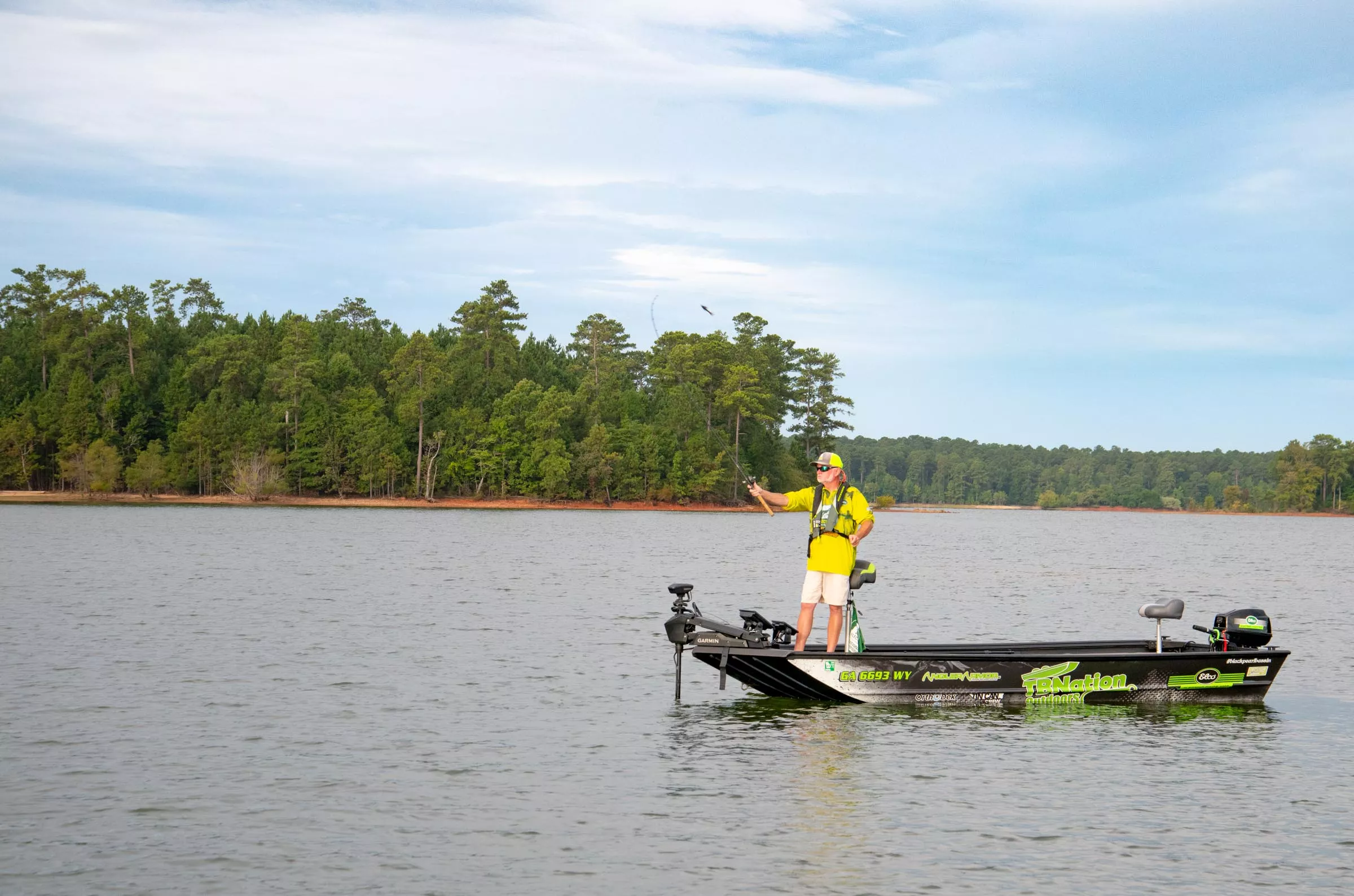Jeff Reese and The Black Pearl

Jeff Reese has been tournament bass fishing since 1981 when he began competing on Georgia’s B.A.S.S. Nation trail. Winners in those club-hosted tournaments go on to compete in bigger events, and before long, Reese was a perennial Top 6 team competitor in Georgia’s State Championship Tournament, as well as B.A.S.S. regional tournaments where winners can qualify for the Bassmaster Classic — the Super Bowl of bass fishing.
As often happens, Reese’s career supervising public parks and recreation activities drew him away from the fishing tournament trail, but through four decades of public service, where he helped others enjoy the outdoors, the lure of sport bass fishing always lingered.
In 2004, while fishing Lake Seaton, a Carroll County watershed lake that prohibits gas outboards, Reese hooked into the idea of an all-electric bass fishing club. It would be an opportunity for a budget-minded bass fisherman to compete in the smaller, less crowded lakes and ponds that are numerous in Georgia. The rods, reels, and fishing lures are the same as the big guys, but the boats and related gear are within reach of just about any angler’s budget.
Before long, a fast-growing network of electric-only bass clubs in Georgia and the adjoining states began competing regionally. Electric bass tournaments became the proving grounds for numerous advancements in Jon boat design, electric motors, batteries, and fishing gear. Fishing benefited, too.
“In a gas-powered bass boat, you might run 20 miles before you sit down to fish because it’s where you think you’ll get the best bite, but there are probably just as many fish right around where you took off from. Fishing electric-only lakes force you to learn to catch those fish closer to the boat ramp. It really made me a better fisherman,” Reese says. “I’ve learned more about fishing creek channels, drop-offs, and ledges in small lakes than I ever did on the big-boat tournament circuit.”
Early on, most boats utilized only traditional electric trolling motors. “Some boats were running two or more on the back and one on the front,” Reese recalls. But there was a problem with that setup. Trolling motors are not designed to run hard for several miles, so they tend to overheat. In most cases, the average life expectancy of these overworked motors was less than three years.
As the electric bass club network grew, the Georgia Bass Total Electric Championship tournament series formed with Reese’s club, XTREME Jonboat Anglers, as a charter member. “It’s been a huge success,” Reese says. “ We just wanted to raise awareness of the sport of electric tournament bass fishing. The idea took wings thanks to many dedicated individuals.” Today, dozens of electric-only bass clubs in Georgia and the adjoining states represent more than 500 all-electric bass anglers, and Reese estimates there are at least that many additional anglers fishing electric boats who aren’t affiliated with clubs.
Today, numerous online forums offer advice on Jon boat design, and companies like Tiny Boat Nation meet the needs of electric Jon boat fishermen nationwide. For Reese, what started as a Lowe 1650 Roughneck Jon boat became The Black Pearl — one of the most recognizable tournament boats in Georgia — but not without work. “I like what one of the boat builders uses as a tagline: ‘We don’t buy our boats, we build them,” Reese says. “When you buy an $80,000 bass boat, it’s already set to fish. The motor, the live wells, the electronics, they’re all there. You don’t need to do anything.” But heavy bass boats require big gas motors and burn considerable fuel, and at least at the time this article is being written, no companies offer turn-key lighter-weight Jon boats that are ideal for electric propulsion.
In Reese’s case, he learned a lot about boats in his early days of electric propulsion. It wasn’t until 2014 that he bought his first truly electric motor designed for primary propulsion. But after three years of service, the motor failed. He found himself needing a new motor — one that was perfectly designed for this type of use. After careful consideration, Reese chose Elco. “They were the obvious choice with more than 100 years in the business of designing and selling electric boat motors,” he says. It was a decision he hasn’t regretted.
The Black Pearl is equipped with Elco’s EP-20, 48-volt motor system along with the most advanced marine electronics and technology available. “I love the Elco motor and it checks every box so far as power, ease of operation, and dependability,” Reese says. “Back when I was fishing the mainstream tournament circuit, I was really proud of my $70,000 Ranger bass boat, but I’m more proud of The Black Pearl that I created myself, from just a no-frills duck-boat shell.”
Always a public servant, Reese still volunteers with local recreation departments and groups to promote his fishing passion. “This sport has been a big part of my life and I just want to pay that opportunity forward.” XTREME Jonboat Anglers, Reese’s club, is an outlet for the Georgia High School BASS League competitors and his club has members who fish it. One club member even coaches a local high school fishing team.
“We have teams with small homemade Jon boats that have a trolling motor on the back and one in the front, yet they are competing with more advanced setups and having success,” Reese says. There is also a comradery — fierce yet friendly competition — that makes all-electric tournaments more accessible to new tournament participants.
“You don’t have to mortgage the house to get in this sport. And with great companies like Elco at the forefront of electric boat motor technology and support, the future looks brighter than ever.”


